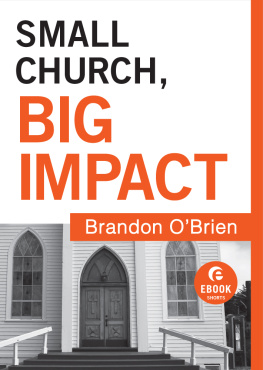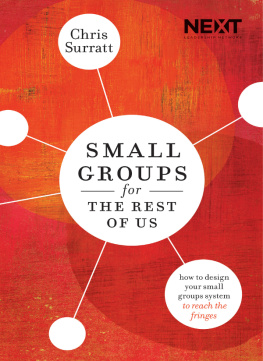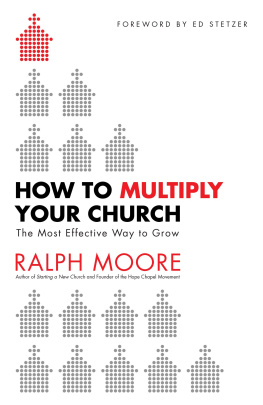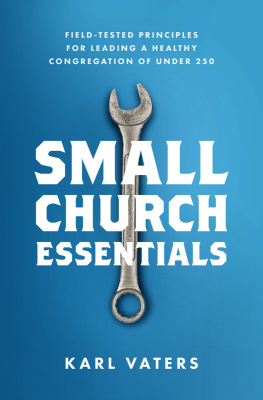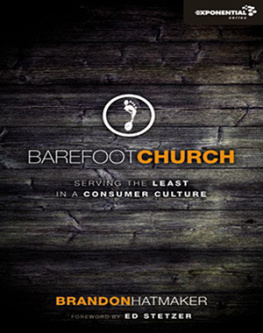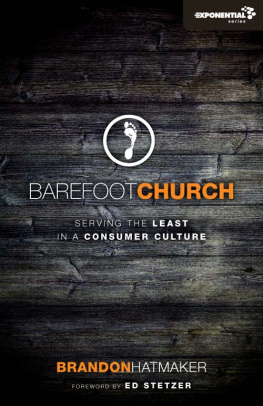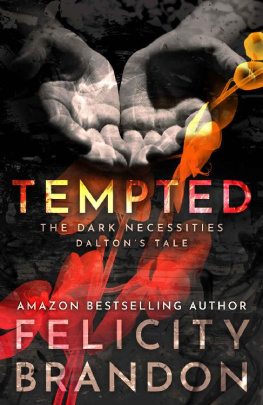Brandon J. OBrien - Small Church, Big Impact
Here you can read online Brandon J. OBrien - Small Church, Big Impact full text of the book (entire story) in english for free. Download pdf and epub, get meaning, cover and reviews about this ebook. year: 2011, publisher: Baker Publishing Group, genre: Religion. Description of the work, (preface) as well as reviews are available. Best literature library LitArk.com created for fans of good reading and offers a wide selection of genres:
Romance novel
Science fiction
Adventure
Detective
Science
History
Home and family
Prose
Art
Politics
Computer
Non-fiction
Religion
Business
Children
Humor
Choose a favorite category and find really read worthwhile books. Enjoy immersion in the world of imagination, feel the emotions of the characters or learn something new for yourself, make an fascinating discovery.
- Book:Small Church, Big Impact
- Author:
- Publisher:Baker Publishing Group
- Genre:
- Year:2011
- Rating:5 / 5
- Favourites:Add to favourites
- Your mark:
- 100
- 1
- 2
- 3
- 4
- 5
Small Church, Big Impact: summary, description and annotation
We offer to read an annotation, description, summary or preface (depends on what the author of the book "Small Church, Big Impact" wrote himself). If you haven't found the necessary information about the book — write in the comments, we will try to find it.
By gathering stories about effective churches from small-church pastors, Brandon OBrien demonstrates that a churchs success is not contingent on its size. This is a selection from Brandon OBriens book, The Strategically Small Church.
Small Church, Big Impact — read online for free the complete book (whole text) full work
Below is the text of the book, divided by pages. System saving the place of the last page read, allows you to conveniently read the book "Small Church, Big Impact" online for free, without having to search again every time where you left off. Put a bookmark, and you can go to the page where you finished reading at any time.
Font size:
Interval:
Bookmark:

Small Church, Big Impact
Copyright 2010, 2011
Brandon J. OBrien
Ebook edition created 2011
Cover design by Dan Pitts
Unless otherwise identified, Scripture quotations are from the HOLY BIBLE, NEW INTERNATIONAL VERSION. Copyright 1973, 1978, 1984 by Biblica, Inc. Used by permission of Zondervan. All rights reserved world wide. www.zondervan.com
The material in this book is adapted from The Strategically Small Church by Brandon OBrien.
All rights reserved. No part of this publication may be reproduced, stored in a retrieval system, or transmitted in any form or by any meanselectronic, mechanical, photocopying, recording, or otherwisewithout the prior written permission of the publisher. The only exception is brief quotations in printed reviews.
Published by Bethany House Publishers
11400 Hampshire Avenue South
Bloomington, Minnesota 55438
www.bethanyhouse.com
Bethany House Publishers is a division of
Baker Publishing Group, Grand Rapids, Michigan.
www.bakerpublishinggroup.com
ISBN 978-1-4412-7071-9
Library of Congress Cataloging-in-Publication Data is on file at the Library of Congress, Washington, DC.
F or Amy, a gracious partner and passionate minister of the gospel. And for Anchor Baptist Church, the best small church Ive yet had the pleasure to know.
I pastor a small church that we planted nine years ago. I love our congregation and what God is doing through it. So why is it I feel insecure every time someone asks me how many people attend our church? Why do I think the success of my church plant is going to be judged by the number of congregants we have? And why do I feel the urge to report higher numbers? If you pastor a small church, be honest, you struggle with the same thoughts.
A couple of years ago, I attended a large pastors conference close to my home in Orange County. The speakers were amazing, the program exciting, and the energy contagious. On many levels it was inspiring, but something about it made me uneasy. On my second day at the conference, I realized what it was: Every one of the speakers on the big stage pastored a mega-church of thousands. Yet the vast majority of the pastors in attendance were at churches of less than five hundred. How do I know? Because these are the facts. According to the Hartford Institute for Religion Research, 94 percent of all existing churches have less than five hundred attendees, and two-thirds of these have less than one hundred. Churches of more than two thousand attendees represent less than one half of one percent of all churches in America. As I sat at the conference, I wondered why we hold these mega-churches up as the model of ministry for every church. Is it because, I asked myself, they are large and successful? Yet if the majority of pastors are serving at small churches and these conferences are meant to equip and encourage these pastors, why are there no small-church pastors up on the big stage who can teach us what it means to be a small-church pastor? Certainly there are some amazing leaders and teachers at small churches. Could it be because we have bought into the notion that small churches are failed churches and they can only become successful if they follow a certain plan and grow to a certain size? Why have we allowed the ministry experience of one half of one percent of all churches to become the standard by which we judge the remaining 99.5 percent of churches?
What if we saw reality differently? What if Gods plan for most churches is to be small? What if the best model for the church is to stay under five hundred people, and even closer to the tipping point of one hundred fifty? Could it be that we have hundreds of thousands of insecure, depressed small-church pastors who have no reason to feel inadequate? And if we changed our perspective, dreamed a different dream, what difference would it make, not just for the psyche of the pastors in America but for the advancement of Gods kingdom purposes?
This is the dream that Brandon OBrien has dared to dream. He is out to change the perception that small churches have failed models of ministry. Never does he say that all small churches are healthy just because of their size. They may not be. But what he does in these pages is show that small churches have amazing strategic advantages.
Brandon is involved in the exercise of changing perceptions. And I found my perspective shifting as I read. I felt less trapped in the narrative of obscurity that is the birthright of small-church pastors. I became more emboldened and confident that I am part of a missional movement of churches that is changing the world in the global South and someday in this country, as well. It is my hope that small-church pastors, leaders, and members will read this book and stop wasting valuable energy trying to imitate large-church ministry, and instead recognize the inherent and strategic strengths of small churches. This means getting excited about what God is doing and plans to do through your church. Read this book and be inspired. I was.
Jim Belcher, author of Deep Church
T his is a book about strategically small churches. No doubt the words strategically and small mean different things to different people. And when you put the words together strategically small they may not mean anything to anyone. (To make matters worse, the definition of the word church has been up for debate in recent years, too. I dont intend to wander into that minefield.) But if youll humor me for just a few paragraphs, I hope to tell you what this book is about and why you should read it.
Let me start by telling you what I dont mean when I use the word strategically . I dont mean to imply that this book will offer you strategies and methods for helping your small church become large. There are plenty of those sorts of books on the market, and I wouldnt be qualified to write one if I wanted to. In other words, I am not assuming in this book that the local churchs primary goal is to grow in numbers.
On the other hand, I also do not mean to offer strategies and methods to help you keep your church from growing. Strategically small does not mean intentionally small. You will meet a few pastors and churches in these chapters who feel called to plant many small churches rather than growing a single large one. But they are in the minority. There are many books on the market today that suggest churches should be kept small so they can remain faithful to their mission, that being large is necessarily bad. This is not one of those books.
You might think that the word small is self-explanatory. I thought the same thing not long ago. But Ive found after talking to pastors around the country and researching small churches in America that there is great disagreement over what makes for a small congregation. It turns out pastors will compete over anything. Tell a minister about a church of 150, and he just might say, Thats not a small church. There are only twenty-five people in my congregation. Now thats a small church.
For our purposes in this book, Ive chosen to define small broadly. I tell stories from my own experience as a pastor in very small congregations. The smallest was made up of a single family, about six people, and the largest had about 100 members at its high point. The church I served the longest had around twenty in regular attendance. But I also tell stories of congregations with 200 or more members. With only one exception that I know of, every church I highlight has fewer than 300 regular attendees. The overwhelming majority of churches in America have fewer than 500 attendees (more on this in the next chapter). Over half have fewer than 300. And while I know that a church of 300 faces very different challenges than a church of fifty, I believe the contents of this book are applicable to nearly every congregation, and I dont want to exclude anyone from reading it on the basis of size.
Font size:
Interval:
Bookmark:
Similar books «Small Church, Big Impact»
Look at similar books to Small Church, Big Impact. We have selected literature similar in name and meaning in the hope of providing readers with more options to find new, interesting, not yet read works.
Discussion, reviews of the book Small Church, Big Impact and just readers' own opinions. Leave your comments, write what you think about the work, its meaning or the main characters. Specify what exactly you liked and what you didn't like, and why you think so.

